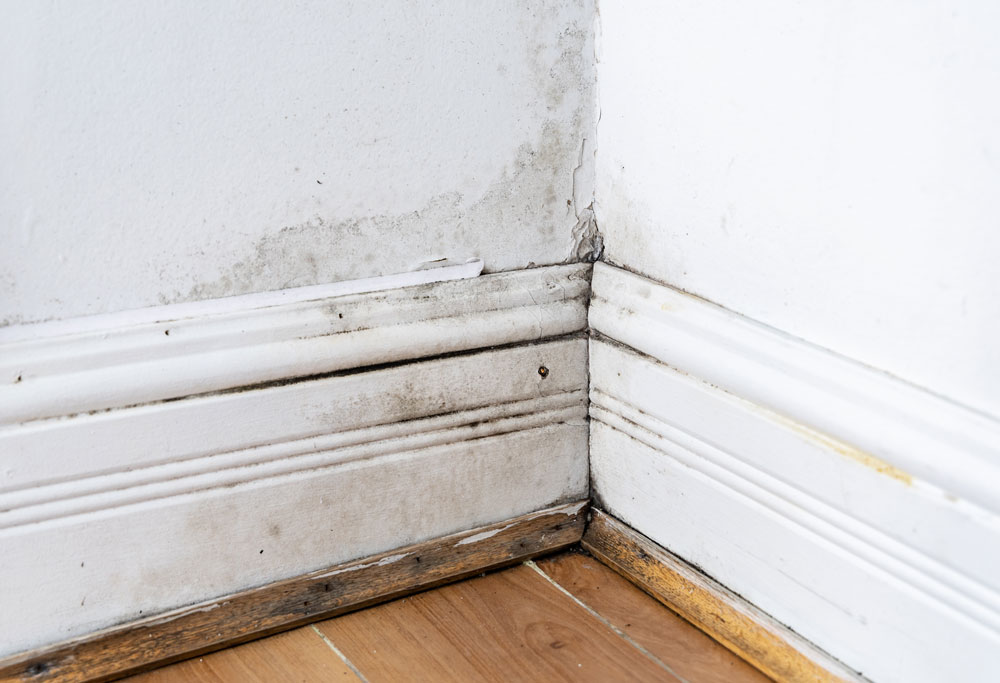Why Is There Mould In My Bedroom?
 CONTENTS
CONTENTS
- What causes mould growth in the bedroom?
- The dangers of mould in bedrooms
- The signs of mould growth in the bedroom
- How to get rid of mould in your bedroom
- How to prevent mould in the bedroom
- Contact our team today
Discovering mould in your bedroom can be a real worry. Not only is it aesthetically displeasing, but its presence can also have a detrimental effect on both your health and property.
Here at ICE Cleaning, we offer long-lasting mould remediation services. We are a corporate member of Dewpoint Professional, and our technicians have many years of experience eliminating mould from commercial and domestic properties.
Continue reading to find out what is causing mould growth in your bedroom and how to remove it.
What causes mould growth in the bedroom?
Mould grows in environments that contain excess moisture. It is normally triggered by high humidity, rising and penetrating damp, condensation, inadequate ventilation, and poor air circulation.
In a bedroom specifically, mould is usually caused by high humidity which is created by the amount of water vapour we exhale as we sleep. When this moist air comes in contact with a cold surface like a window or wall, the water vapour condenses, making the surfaces damp.
Mould can also be found in closets and wardrobes, mainly due to the poor air circulation inside them. Mould spreads by releasing spores and a small growth in your closet can soon take over the rest of the bedroom.
In addition, lack of sunlight is another reason why mould might grow in your bedroom. Mould prefers dark environments since direct sunlight inhibits its growth.
The dangers of mould in bedrooms
Firstly, mould can pose serious health risks. Exposure to spores may trigger allergic reactions or asthma attacks for those with the respiratory condition. Additionally, some types of mould, like Cladosporium and Stachybotrys chartarum produce mycotoxins that could lead to more severe illnesses.
Certain groups, such as those with a weakened immune system or pre-existing respiratory problems are especially vulnerable to mould exposure.
Besides health concerns, there's the issue of damage to your belongings. Mould feeds off organic materials, so some kinds of fabric, paint and wallpaper, and building materials can deteriorate overtime if it starts growing on them. It can even lead to structural damage in your property.
A quick, thorough response as soon as you spot mould in your home is crucial to protect your home and health against mould.
The signs of mould growth in the bedroom
- A musty, damp smell that persists even after cleaning: this odour is caused by microbial volatile organic compounds which mould produces.
- Dark spots and discolouration on walls, ceilings or furnishings like curtains and carpets: mould can be a range of colours, from black to pink, so be wary of any new marks in your home.
- Persistent symptoms of a cold or allergic reaction including coughing, sneezing, red eyes or skin irritation: if these symptoms ease when you leave home only to return upon arrival, mould is likely growing in your home.
You can learn more about how to spot the different signs of mould in this blog.
How to get rid of mould in your bedroom
Although you may be tempted to remove mould yourself, it is recommended you bring in professionals for mould remediation.
To begin with, mould cleaners have access to industry-leading mould removal products, tools, and techniques for a thorough clean. You can be sure they will tackle your mould problem successfully.
Professionals are trained in safety procedures during mould remediation tasks, ensuring no harm comes upon you or them during the process. They can even cover up the affected area to prevent mould spreading around your home during the treatment.
They don't just clean the mould growth; they find out what is causing it and advise on prevention in the future to keep your home mould-free.
How to prevent mould in the bedroom
Making your bedroom resistant to mould starts with managing moisture. Make sure humidity levels stay below 50% all day with dehumidifiers and air conditioners. Open windows when possible, particularly in the mornings.
Good airflow helps keep dampness at bay, as well, and gets rid of stale pockets of air that get trapped behind furniture.
If you have an ensuite bathroom, use an extractor fan and keep the door closed to stop steam travelling into your bedroom. It is also recommended that you regularly air out items that absorb moisture, like mattresses and carpets.
You should regularly clean closets and wardrobes, too, to get rid of any dust and dirt that mould can feed off of. Another tip is not stowing away damp clothes and ensuring there is sufficient space between your clothes to allow airflow.
Make sure your bedroom is heated to prevent surfaces like walls and windows getting too cold. This will reduce the likelihood of condensation forming. You can find out more about the best ways to prevent mould in your home here.
Contact our team today
Our nine-stage mould removal process can eradicate all the mould in your home, including mould in the air. We also offer a lifetime guarantee* with every mould remediation so if the mould returns after treatment, we will remove it for free.
Get in touch today on 0208 066 0360 or enquiries@icecleaning.co.uk to get your free site survey and no-obligation quote.
*subject to advisories

Speak with me today,
I’m here to help
By asking you a few questions either via phone or email I can immediately provide a realistic estimation of the cost.
You’re in good company. We’ve cleaned for the following commercial clients… View all

Why choose us?
- Cater to a wide variety of cleaning situations
- Nationwide coverage, available 24/7
- Cater to commercial and domestic clients
- Free survey provided prior to quotation
- Emergency response team
- Offer a bespoke service designed to suit all your needs
- All technicians hold professional health and safety qualifications, including BICSc, IOSH, Dewpoint Professional & Safe Contractor
We’re fully accredited
We place best practise, professional expertise and health and safety at the core of our business. We’re fully compliant with all legal obligations. You can view a list of our accreditations below, or visit our Health & Safety page for more information.











-RGB-small.1707319151.jpg)




















